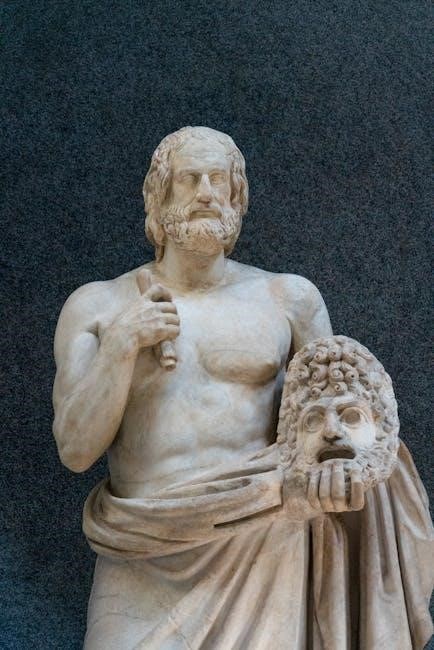Euripides’ Medea is a timeless tragedy exploring themes of revenge, betrayal, and morality. Available as a PDF on Project Gutenberg, it remains a cornerstone of classical literature, offering profound insights into human nature and societal norms through its dramatic structure and intense character development.
Overview of the Play
Medea, a tragedy by Euripides, revolves around the story of Medea, a barbarian princess, and her husband Jason, the leader of the Argonauts. The play explores themes of revenge, betrayal, and morality, set against the backdrop of their doomed romance. After helping Jason secure the Golden Fleece, Medea is abandoned by him for a Greek princess, leading to her devastating revenge. The play delves into the psychological and emotional turmoil of Medea, showcasing her transformation from a loving wife to a vengeful figure. Euripides’ masterful portrayal of human emotions and societal expectations makes Medea a profound and enduring work of classical literature. The PDF versions, such as the Project Gutenberg edition, provide accessible reads of this timeless tragedy.
Historical Context of the Tragedy
Euripides’ Medea premiered in 431 B.C. at the City Dionysia festival in Athens, where it received the third prize, reflecting its controversial reception. The play is set against the backdrop of ancient Greek mythology, drawing from the legend of Jason and the Argonauts. The historical context highlights the societal norms of Athens, particularly the tension between Greek and barbarian cultures, as Medea is a foreign princess from Colchis. Euripides’ portrayal of Medea as a powerful, vengeful woman challenged the patriarchal norms of the time, making her a complex and controversial figure. The play’s exploration of revenge and morality resonated with the Athenian audience, though its unconventional style and themes initially met with skepticism. The PDF editions, such as the Project Gutenberg version, provide insights into the historical and cultural significance of this tragedy.

Euripides’ Style and Influence
Euripides’ Medea showcases his innovative and provocative style, blending intense emotional drama with philosophical inquiry; His use of realistic dialogue and psychological depth set him apart from other tragedians. The play’s exploration of complex moral themes and its unflinching portrayal of revenge influenced later writers and thinkers. Euripides’ work often challenged societal norms, particularly in its depiction of strong female characters like Medea, who defied traditional gender roles. His influence extends beyond ancient Greece, with Medea remaining a cornerstone of classical literature. The PDF editions, such as those from Project Gutenberg and the Loeb Library, ensure his work remains accessible, preserving its historical and cultural significance for modern readers. Euripides’ bold storytelling continues to inspire adaptations and interpretations across the arts.

Plot Summary of Medea
Medea tells the story of a barbarian princess who seeks revenge after being betrayed by her husband, Jason. The tragedy unfolds with her ruthless vengeance, leading to devastating consequences. Available as a PDF on platforms like Project Gutenberg, the play remains a gripping exploration of love, betrayal, and retribution.
The Quest for the Golden Fleece
Jason, son of King Aeson of Iôlcos, was exiled as a child after his uncle Pelias seized the throne. Upon returning, Jason demanded his rightful place, but Pelias tasked him with retrieving the Golden Fleece from Colchis. To achieve this, Jason assembled the Argonauts, a group of Greece’s finest heroes, and set sail on the Argo. The journey was fraught with challenges, including battling harpies, navigating the Clashing Rocks, and confronting the dragon guarding the fleece. Medea, the enchantress daughter of King Aeêtes, fell in love with Jason and aided him by slaying the dragon and deceiving her father. Her help was crucial, as Jason could not have succeeded without her magic. The quest culminated in their escape with the fleece, but it also sowed the seeds of future tragedy, as Medea’s devotion would later turn to vengeance. This epic tale of adventure and betrayal is vividly captured in Euripides’ Medea, available as a PDF on platforms like Project Gutenberg.
Medea’s Help to Jason
Medea, the barbarian princess, played a pivotal role in Jason’s quest for the Golden Fleece. Driven by love, instilled by Aphrodite, she defied her father, King Aeêtes, to aid Jason. Using her magical powers, Medea slew the sleepless serpent guarding the fleece and deceived her father, enabling Jason to secure the treasure. Her assistance was indispensable, as Jason could not have succeeded without her intervention. Medea’s actions, however, came at a great personal cost, leading to her exile and setting the stage for future tragedy. This pivotal moment in their relationship is explored in Euripides’ Medea, available as a PDF in editions like the Project Gutenberg and Warner Collection, highlighting her complex character and the consequences of her devotion.
The Voyage Home and Its Challenges
After securing the Golden Fleece, Jason and the Argonauts, aided by Medea, embarked on a perilous journey home. Their route, as detailed in Euripides’ Medea, took them through treacherous waters, including the Ister, Eridanus, and African Syrtes. Medea’s magical prowess continued to prove invaluable, helping the crew navigate these dangers. However, the voyage was not without its trials, as the group faced numerous obstacles and challenges that tested their resolve. Medea’s influence during this phase solidified her importance to the expedition, yet it also highlighted the cultural and personal tensions that would later surface. The journey home, as depicted in the PDF editions of the play, such as the Project Gutenberg and Warner Collection versions, underscores the complexity of Medea’s role and the seeds of future conflict.
Jason’s Betrayal and Medea’s Revenge
Jason’s betrayal of Medea, as depicted in Euripides’ tragedy, sparks a devastating chain of events. Despite her unwavering support and sacrifices, Jason abandons Medea for Creon’s daughter, seeking political stability and social acceptance. This betrayal enrages Medea, who feels deeply dishonored and betrayed. In a calculated act of revenge, she sends a poisoned robe to Jason’s new bride, killing her and Creon. Medea then slays her own children to prevent them from falling into Jason’s hands, a heart-wrenching act that underscores her anguish and determination. Euripides masterfully portrays Medea’s transformation from a loving partner to a vengeful avenger, highlighting the destructive power of betrayal and the extremes of human emotion. The PDF versions, such as those from Project Gutenberg and the Warner Collection, provide detailed accounts of this tragic sequence, emphasizing its enduring impact on classical literature.
The Tragic Conclusion
The tragic conclusion of Euripides’ Medea unfolds with devastating consequences. After Medea’s brutal revenge, she escapes to Athens, leaving Jason shattered and grief-stricken. The deaths of Creon, his daughter, and Medea’s children mark the play’s climax, highlighting the irreparable destruction caused by betrayal and vengeance. Jason, once a celebrated hero, is left alone, his glory tarnished by personal loss. Medea, though victorious in her revenge, is forever haunted by her actions. The play ends with a sense of unrelenting tragedy, underscoring the futility of revenge and the enduring suffering it perpetuates. The PDF versions of the play, such as those from Project Gutenberg and the Warner Collection, capture the emotional depth of this conclusion, leaving readers with a profound reflection on human frailty and moral complexity.

Characters in Medea
The play features complex characters, including Medea, the vengeful barbarian princess; Jason, the flawed hero; Creon, the authoritative king; and the chorus, providing moral insight.
Medea: The Barbarian Princess
Medea, a powerful and complex figure, is central to Euripides’ tragedy. As a barbarian princess from Colchis, she embodies both intelligence and fierce passion. Her deep love for Jason, which initially drives her to aid him in his quest for the Golden Fleece, turns to devastating revenge when he betrays her. Medea’s character is marked by her magical abilities and unyielding determination, making her one of the most formidable female characters in Greek tragedy. Her transformation from a loving partner to a vengeful adversary highlights the destructive nature of betrayal and the societal constraints placed on women. Through her actions, Medea challenges the norms of her time, leaving a lasting impact on the narrative.
Jason: The Hero of the Argonauts
Jason, the leader of the Argonauts, is a complex figure whose heroic status is overshadowed by his flawed character. As the son of King Aeson, he embarks on a quest for the Golden Fleece, achieving great feats with the help of Medea. However, his ambition and desire for power often lead him to prioritize his career over personal relationships. Jason’s decision to abandon Medea for Creon’s daughter reflects his pragmatic nature and lack of emotional depth. Despite his bravery, his treatment of Medea reveals a self-serving attitude, ultimately triggering her devastating revenge. Jason’s character serves as a cautionary tale about the consequences of betrayal and the pursuit of glory at the expense of love and loyalty.
Creon: The King of Corinth
Creon, the ruler of Corinth, plays a pivotal role in the tragedy as the catalyst for Medea’s revenge. Desiring a strong successor, he offers his daughter’s hand in marriage to Jason, unaware of the turmoil this will unleash. Creon’s decision to banish Medea, fearing her magical powers and foreign origins, accelerates the tragic events. His actions, though motivated by political and personal gain, reveal a lack of foresight and empathy. Creon’s character symbolizes the rigid societal norms and xenophobia prevalent in ancient Greece, which view Medea as an outsider and a threat. His fate serves as a stark reminder of the devastating consequences of underestimating the wrath of a wronged woman.
The Chorus: Role and Significance
The Chorus in Euripides’ Medea serves as a moral and emotional commentator, providing context and reflecting the audience’s sentiments. Composed of Corinthian women, they express sympathy for Medea’s plight while fearing her wrath. Their odes bridge scenes, offering insights into the characters’ motivations and the unfolding tragedy. The Chorus highlights themes of love, betrayal, and justice, emphasizing Medea’s emotional turmoil and Jason’s duplicity. Their presence underscores the inevitability of the tragic outcome, adding depth to the drama. Through their observations, the Chorus humanizes Medea’s suffering and critiques societal norms, making them a vital element in the play’s emotional and thematic structure.
Minor Characters and Their Roles
In Euripides’ Medea, minor characters play crucial roles in advancing the plot and highlighting themes. The Tutor, for instance, provides insight into Medea’s emotional state and serves as a messenger between characters. The Messenger delivers the tragic news of Creon’s and his daughter’s deaths, intensifying the play’s climax. Medea’s children, though unnamed in the play, symbolize her maternal love and the innocent victims of her revenge. These characters, while not central, contribute to the dramatic tension and underscore the moral complexities of the story. Their roles are essential in shaping the tragedy’s outcome and emphasizing the devastating consequences of Medea’s actions.

Themes in Medea
Revenge, betrayal, and morality dominate Euripides’ Medea. The play explores love turned to hatred, deception, and the clash between justice and vengeance, highlighting the destructive power of unchecked emotions and societal norms.
Revenge and Retribution
Medea’s relentless pursuit of revenge drives the play’s tragic core. Betrayed by Jason, she transforms from a loving partner into a vengeful force, seeking retribution for his abandonment. Euripides masterfully portrays her emotional turmoil, as love turns to hatred, fueling her destructive actions. Medea’s revenge is both calculated and brutal, targeting not only Jason but also his new wife, Creon, and even her own children. Her actions, though horrifying, stem from a deep sense of injustice and betrayal. The play explores the cyclical nature of revenge, where retribution leads to further suffering, leaving no party unscathed. Euripides’ portrayal of Medea’s vengeance underscores the devastating consequences of unchecked emotions and the futility of seeking justice through revenge.
Love and Betrayal
At the heart of Medea lies a tragic exploration of love and betrayal. Medea’s deep love for Jason, which once drove her to sacrifice everything for him, turns to bitter hatred when he betrays her by marrying Creon’s daughter. Euripides masterfully portrays the destructive power of unrequited love, as Medea’s devotion curdles into vengeance. Jason’s betrayal is not merely a personal rejection but a violation of the trust and loyalty Medea had unwaveringly offered. The play highlights how love, when corrupted by deceit, can lead to devastating consequences. Medea’s emotional journey from adoration to fury underscores the fragility of love and the chaos that ensues when it is exploited. This theme remains a timeless commentary on the dangers of betrayal and the enduring complexity of human emotions.
Deception and Manipulation
Deception and manipulation are central to the tragic narrative of Medea. Medea, a master of cunning, uses her intelligence and magical powers to outwit those who wrong her. She manipulates Creon by pretending to accept her exile, while secretly plotting her revenge. Similarly, she deceives Jason, feigning reconciliation to gain his trust. Euripides portrays Medea as a complex figure who employs deception not only to achieve her goals but also to assert her power in a society dominated by men. Her actions highlight the theme of manipulation as both a tool for survival and a catalyst for destruction. Through Medea’s strategies, the play explores the moral ambiguity of deception and its consequences, leaving the audience to grapple with the ethical implications of her actions.
Justice and Morality
In Medea, justice and morality are explored through the protagonist’s quest for retribution and the societal norms of ancient Greece. Medea’s actions challenge the notion of justice, as she seeks vengeance against Jason for his betrayal. Her belief in her own moral code, rooted in loyalty and honor, drives her to commit atrocities, raising questions about the morality of her actions. Euripides examines the tension between personal justice and societal morality, highlighting the ambiguity of right and wrong. The play critiques the double standards of Greek society, where men like Jason are pardoned for their transgressions, while women like Medea are condemned. This moral complexity leaves the audience questioning whether justice can ever be truly achieved in a flawed world. Euripides’ portrayal of Medea’s struggle underscores the enduring debate over justice and morality in human society.
Feminism and Gender Roles
Euripides’ Medea is a powerful exploration of feminism and gender roles in ancient Greek society. Medea, a barbarian princess, defies patriarchal norms by asserting her autonomy and rejecting the passive role expected of women. Her actions challenge the societal constraints that marginalize women, highlighting the injustices of a male-dominated world. Euripides portrays Medea as a complex figure who embodies both strength and vulnerability, questioning the limitations imposed on women by Greek culture. The play critiques the double standards that allow men like Jason to pursue their interests while women are expected to remain submissive. Medea’s defiance and ultimate revenge serve as a stark commentary on the oppression of women, making her a symbol of resistance against patriarchal norms. This theme remains a central focus of feminist interpretations of the play.

Historical and Cultural Context
Euripides’ Medea reflects the cultural and societal norms of ancient Greece, exploring themes of justice, morality, and gender roles within a patriarchal society. The play, first performed in 431 B.C., offers insights into the tensions between Greek and barbarian cultures, as well as the role of women in a male-dominated world. Its historical context is deeply rooted in Greek mythology and the traditions of Athenian theater, making it a significant work for understanding the values and conflicts of the time.
Ancient Greek Theater and Tragedy
Ancient Greek theater was a cornerstone of cultural and civic life, with tragedy serving as a medium to explore human suffering and moral dilemmas. Euripides’ Medea, a seminal work of Greek tragedy, exemplifies this tradition. The play adheres to the classical structure of tragedy, featuring a prologue, episodes, and choral odes. The chorus plays a pivotal role, providing commentary and emotional depth. Medea was first performed at the City Dionysia festival in Athens in 431 B.C., where it competed with other works. Despite its groundbreaking themes, it initially received a third prize, reflecting the innovative nature of Euripides’ approach. The play’s exploration of revenge, justice, and gender roles continues to resonate, making it a vital study in the evolution of Western drama. PDF versions, such as those from Project Gutenberg, ensure its accessibility for modern readers.
Euripides’ Life and Works
Euripides, one of the three great tragedians of ancient Greece, was born around 480 B.C. in Salamis and died in 406 B.C. in Macedonia. His works, including Medea, reflect his deep engagement with philosophy and societal issues. Euripides wrote approximately 90 plays, of which 18 have survived. His first play was produced when he was 25, and he won his first victory at the Dionysia festival 13 years later. Known for his innovative style, Euripides often explored complex characters and moral dilemmas, challenging traditional norms. His tragedies, such as Medea, are celebrated for their psychological depth and emotional intensity. PDF editions of his works, including those from Project Gutenberg, provide modern readers with access to his timeless masterpieces, ensuring his legacy endures.
Cultural Significance of Medea
Medea holds profound cultural significance as a masterpiece of ancient Greek tragedy, influencing literature and art for centuries. Its exploration of themes like revenge, betrayal, and gender roles resonates universally. The play’s portrayal of Medea, a powerful yet marginalized figure, challenges societal norms and sparks debates on justice and morality. Available in PDF formats, such as the Project Gutenberg edition, Medea remains accessible to modern audiences, ensuring its relevance in contemporary discussions. Its enduring appeal lies in its ability to provoke reflection on human nature and societal structures, making it a cornerstone of both academic study and theatrical performance. Euripides’ work continues to inspire adaptations and interpretations, cementing Medea’s place in cultural heritage.

PDF Versions of Medea
Medea by Euripides is available in various PDF editions, including the Project Gutenberg version, the Loeb Library edition, and the Warner Collection, offering free access to the tragedy.
Project Gutenberg Edition
The Project Gutenberg Edition of Euripides’ Medea is a freely accessible PDF version of the tragedy, translated by Gilbert Murray. Released on March 2, 2011, it features the original Greek text alongside its English translation, making it a valuable resource for scholars and readers alike. The edition is encoded in UTF-8 and includes a detailed introduction and notes, providing context and insights into the play’s themes and historical background. This version is part of Project Gutenberg’s mission to digitize and preserve classical literature, ensuring that Medea remains accessible to a global audience. It is a significant contribution to the study of ancient Greek tragedy and Euripides’ works.
Loeb Library Edition
The Loeb Library Edition of Euripides’ Medea is a scholarly PDF resource that combines the original Greek text with an authoritative English translation by Kovacs. Published in 1994, this edition is part of the renowned Loeb Classical Library series, known for its meticulous editing and annotations. The text includes Euripides’ Cyclops, Alcestis, and Medea, offering a comprehensive view of his works. This edition is particularly valued for its critical apparatus, which provides insights into textual variations and interpretations. It is an essential tool for classical scholars and students, ensuring a deeper understanding of Euripides’ dramatic style and the cultural context of Medea. The Loeb Library Edition remains a cornerstone of academic study and literary appreciation.
Warner Collection Edition
The Warner Collection Edition of Euripides’ Medea is a public domain PDF that offers the complete text of the tragedy along with detailed notes and an introduction. Edited by Frederic Allen, this edition provides a comprehensive analysis of the play, including its historical context and textual emendations. The Warner Collection is known for its accessible format, making it a valuable resource for both scholars and general readers. This edition is particularly notable for its focus on Euripides’ life and works, offering insights into his artistic style and the cultural significance of Medea. The inclusion of the original Greek text and its English translation enhances its utility for comparative studies, ensuring a rich and immersive reading experience.
Other Notable PDF Editions
Beyond the well-known editions, several other notable PDF versions of Euripides’ Medea are available online. These include translations by scholars like C.A.E. Luschnig, offering both the original Greek text and its English counterpart. Some editions, such as those from the Warner Collection, provide extensive notes and introductions, enriching the reader’s understanding. Additionally, public domain resources like the Gilbert Murray translation on Project Gutenberg remain popular for their accessibility. These diverse editions cater to different scholarly and reading preferences, ensuring that Medea remains accessible to a broad audience. They are invaluable for both academic study and personal exploration of this timeless tragedy.

Analysis of Medea
Euripides’ Medea masterfully explores themes of revenge, morality, and human nature through its dramatic structure and complex characters, offering profound insights into the consequences of betrayal and unchecked emotion.
Dramatic Structure and Style
Euripides’ Medea showcases a masterful dramatic structure, blending intense dialogue, choral odes, and dramatic irony to heighten tension. The play’s clear division into prologue, episodes, and choral interludes creates a rhythmic flow, while Euripides’ innovative use of dialogue explores complex emotions and moral dilemmas. His style often emphasizes psychological depth, particularly in Medea’s soliloquies, revealing her inner turmoil and calculating nature. The chorus serves as both commentator and emotional mirror, reflecting the audience’s reactions. Euripides’ realistic and unflinching portrayal of human suffering and revenge was groundbreaking, setting a new standard for tragic drama. The PDF versions, such as the Project Gutenberg edition, preserve this structure, allowing readers to analyze the play’s dramatic techniques and stylistic innovations in detail.
Character Development and Motivation
In Medea, Euripides masterfully crafts characters driven by intense emotions and complex motivations. Medea, a barbarian princess, evolves from a loving wife to a vengeful outcast, her actions fueled by Jason’s betrayal and her own pride. Jason, portrayed as pragmatic and ambitious, prioritizes political gain over personal loyalty, justifying his abandonment of Medea. The chorus serves as a moral compass, reflecting societal norms while empathizing with Medea’s plight. Euripides’ dialogue delves deep into their psyches, exposing raw emotions and ethical dilemmas. The PDF editions, such as the Project Gutenberg version, highlight these dynamics, offering insights into the characters’ psychological struggles and the tragic consequences of their choices.
Themes and Symbolism
Euripides’ Medea explores profound themes of revenge, betrayal, and justice, intertwined with symbolism that enriches the narrative. The Golden Fleece symbolizes both the object of Jason’s quest and the elusive nature of success. Medea’s magic represents her power and the dual nature of her character, capable of both creation and destruction. The play delves into the complexities of love, highlighting its transformative and destructive potential. The chorus often serves as a moral voice, reflecting on the inevitability of fate and the consequences of human actions. These themes are vividly portrayed in the PDF editions, such as the Project Gutenberg version, which includes analyses that deepen the understanding of Euripides’ symbolic choices and their enduring relevance.
Critical Reception and Interpretations
Euripides’ Medea has sparked diverse critical interpretations, with its complex characters and moral ambiguity. Initially, the play received mixed reviews, as its originality and harsh themes challenged Athenian audiences. Over time, it has been celebrated for its psychological depth and exploration of human nature. Scholars highlight Medea’s multifaceted character, portraying her as both a victim and a perpetrator. The PDF editions, such as those from Project Gutenberg and the Loeb Library, provide insights into these interpretations, offering translations and analyses that illuminate Euripides’ innovative storytelling. Critics often praise the play’s ability to provoke reflection on justice, morality, and the consequences of revenge, making it a timeless work of tragedy. Its enduring relevance is evident in its continued study and adaptation in modern literature and theater.
Euripides’ Medea remains a profound exploration of human nature, revenge, and morality. Its complex characters and intense drama continue to resonate, making it a cornerstone of classical literature. The availability of PDF editions, such as those from Project Gutenberg and the Loeb Library, ensures accessibility for modern readers. These editions provide valuable insights through translations and analyses, enriching our understanding of the play. Despite its initial mixed reception, Medea has endured as a masterpiece of tragedy, offering timeless reflections on justice, love, and betrayal. Its influence persists in literature and theater, cementing its place as a vital work of ancient Greek drama.

